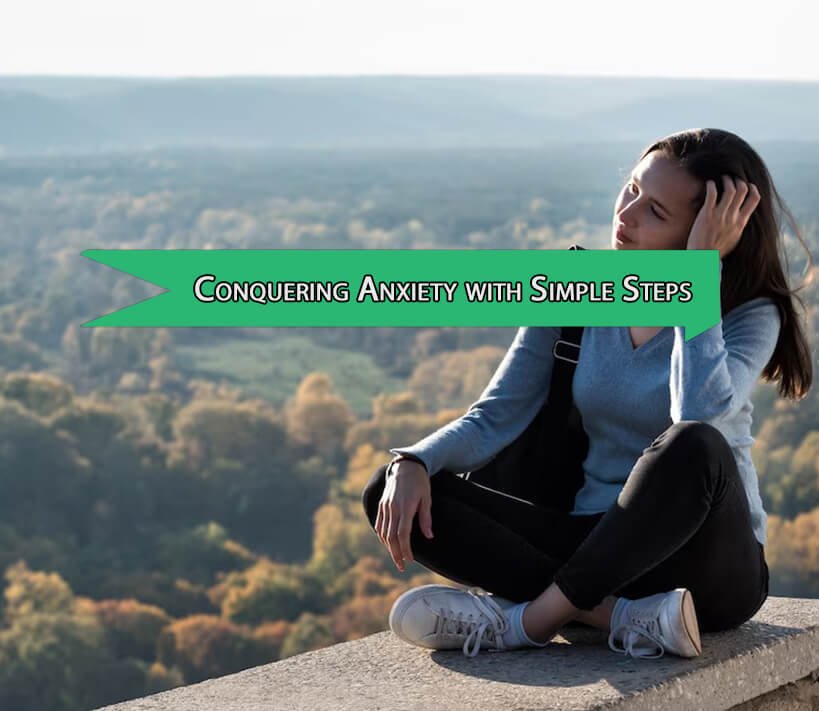Did you know that 1 in 4 people experience anxiety at some point in their lives? With the pressures of modern life, such as social media and uncertain futures, anxiety is becoming more prevalent than ever. However, if a person adopts a few simple steps, they can conquering anxiety and find peace. In this blog, we will explore the meaning of anxiety, its effects on the mind and body, and how to conquering it using simple yet effective steps.
Anxiety is a natural stress response, characterised by feelings of worry, fear, and unease. It is a normal human emotion that everyone experiences at some point in their life. However, when anxiety becomes overwhelming or persistent, it can interfere with our daily lives and impact both our mental and physical health, leading to challenges such as poor concentration, disrupted sleep patterns, and heightened stress levels, which can diminish our quality of life.
Anxiety in Urdu
“اضطراب”، جو کہ ایک ذہنی حالت ہے جس میں انسان کو فکر، بے چینی، اور گھبراہٹ کا سامنا ہوتا ہے۔ یہ حالت عموماً کسی پریشانی، دباؤ یا خوف کی وجہ سے ہوتی ہے، لیکن بعض اوقات بغیر کسی واضح وجہ کے بھی ہو سکتی ہے۔
Symptoms of Anxiety
Anxiety can be triggered by various factors such as personal challenges, health concerns, relationship issues, or financial stress. In many cases, it is triggered by uncertainty or circumstances that are beyond our control. The following are the symptoms of anxiety, but they can vary from person to person:
1. Constant Worry or Fear about situations
2. Rapid heartbeat or Palpitations
3. Restlessness or Difficulty relaxing
4. Trouble Sleeping
5. Difficulty Concentrating
6. Sweating and Trembling
How Anxiety Affects the Mind and Body
Anxiety not only affects your mind but also has significant effects on your body. When we feel anxious, our body enters fight or flight mode, preparing us to confront or escape the threat. This causes physical symptoms, which include :
1. Increased heart rate
2. Shortness of breath
3. Sweating
4. Muscle Tension
5. Fatigue
As time passes, chronic anxiety can lead to serious health issues, such as insomnia, digestive problems, high blood pressure, and a weakened immune system. This highlights the importance of addressing anxiety before it becomes overwhelming.
Steps to Conquering Anxiety
Although anxiety is a regular part of life, there are a few steps you can take to manage it and reduce its impact. Here are some simple yet effective strategies to help you conquering anxiety and lead a more peaceful life.
1. Practice Mindfulness Meditation
The most effective way to manage anxiety is mindfulness meditation. In this practice, a person focuses on the present moment and becomes aware of their thoughts, feelings, and physical sensations without judgment. Mindfulness exercises include deep breathing, body scans, and guided meditation. Practising mindfulness meditation helps reduce the negative impact of anxious thoughts and improves emotional well-being. You can start with a few minutes at the beginning of the day and gradually increase the time as you become more comfortable.
2. Exercise is a Powerful tool for Combating Anxiety
Physical Activity helps release endorphins, which are natural mood boosters. It also reduces the levels of stress hormones that contribute to feelings of anxiety. Regular exercise improves your mental state and enhances your psychoaura, boosting overall well-being. Whether you walk, jog or practice yoga, these activities foster a sense of balance and calm. Set a goal to exercise for at least 30 minutes on most days of the week to maintain a healthier mind and body.
3. Staying Hydrated
Did you know that something as simple as drinking water can play a significant role in managing anxiety? Staying hydrated is crucial for maintaining a balanced mood, as dehydration can trigger feelings of irritability and stress. When you are anxious, your body tends to lose more fluids, which can worsen symptoms. Drinking water helps regulate your body temperature, supports brain function, and improves overall mood by balancing stress hormones. Next time you feel anxious, try drinking a glass of water; it could make a noticeable difference in calming your mind and body.
4. Develop Healthy Sleep Habits
Lack of sleep triggers anxiety, and poor sleep worsens anxiety. Establishing a sleep routine is vital for mental health. Try to go to bed and wake up simultaneously every day, even on weekends. Avoid caffeine, heavy meals, and electronics before bed, as they interfere with your ability to sleep.
5. Talk to Someone
Sometimes, the best way to manage anxiety is to talk about it. You should speak with trusted friends, family members, or therapists; they offer relief and a different perspective. Bottling up your feelings increases both stress and anxiety, so it is essential to express yourself. Do not hesitate to reach out for support when needed.
6. Embrace a Healthy Lifestyle
A balanced diet of fruits, vegetables, whole grains, and lean proteins can help regulate mood and energy levels. Avoid skipping meals, as low blood sugar can worsen anxiety symptoms. Incorporating relaxation techniques such as deep breathing or progressive muscle relaxation can also help reduce stress and anxiety.
Dua For Anxiety and Stress
In Islam, there are several duas (supplications) that can help in managing anxiety. Here is one such dua that is commonly recited for relief from anxiety and stress:
Dua for Anxiety:
اللّهُمَّ إِنِّي أَعُوذُ بِكَ مِنْ الْهَمِّ وَالْحَزَنِ وَالْعَجْزِ وَالْكَسَلِ وَالْجُبْنِ وَالْبُخْلِ وَغَلَبَةِ الدَّيْنِ وَقَهْرِ الرِّجَالِ
Translation:
“O Allah, I seek refuge with You from anxiety and grief, from weakness and laziness, from cowardice and miserliness, from the burden of debt and the domination of men.”
This dua is powerful for relieving emotional burdens and seeking Allah help in difficult times.




